The Suburban Dictionary
How the sniglet took over, to the point where people use sniglets without realizing it. Sniglets don't appear in the dictionary, but they probably should.
Hey guys, Ernie here with an item from a brand new writer for the newsletter, Karen Corday. Today, she has a whole lot to tell you about sniglets. What’s a sniglet? Read on to find out.
Tonight's GIF features Rich Hall, of course.
Sponsored By … You?
If you find weird or unusual topics like this super-fascinating, the best way to tell us is to give us a nod on Ko-Fi. It helps ensure that we can keep this machine moving, support outside writers, and bring on the tools to support our writing. (Also it’s heartening when someone chips in.)
We accept advertising, too! Check out this page to learn more.
10M
The number of HBO subscribers, globally, in 1982, the year that the network started airing Not Necessarily the News. The network, launched in 1972, first aired the 1971 Paul Newman and Henry Fonda logging family saga Sometimes a Great Notion to 325 subscribers in Wilkes-Barre, PA, thus beginning its reign as the first and to this day longest continually-operating pay television channel in the United States.
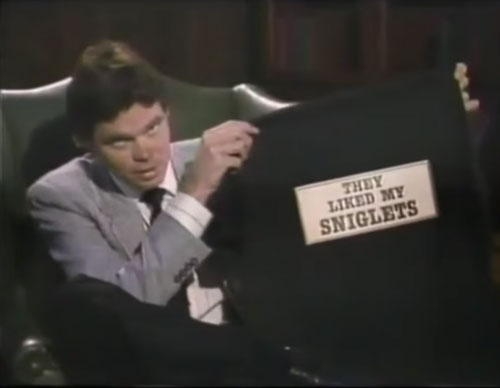
Rich Hall, holding a "They Liked My Sniglets" T-shirt.
How the sniglet, for a time, became a phenomenon bigger than HBO
In 1982 HBO started producing and broadcasting its own original programming, including the Jim Henson children’s show Fraggle Rock, the mystery anthology series The Hitchhiker, and the satirical news program Not Necessarily the News.
NNTN introduced the viewing public to the work of Conan O’Brien and Greg Daniels before they went on to write for The Simpsons, Jan Hooks before she went on to Saturday Night Live, and the eventually ubiquitous concept of editing news footage in order to make fun of it in the manner of Songify the News or Bad Lip Reading.
“The best bits are those that play with news film or tape, dubbing new—and much funnier—words into the mouths of world leaders, stopping action or repeating it, doctoring press-conference footage so that officials’ replies to correspondents appear to be answers to silly questions put by cast members,” raves a TV Guide review from 1985.
Its biggest hit, however, and the contribution for which NNTN remains knows to this day, was sniglets.
The word “sniglet” is itself a sniglet, according to comedian/NNTN cast member/creator of sniglets Rich Hall and is defined as “any word that doesn’t appear in the dictionary but should.”
Before NNTN, Hall had, according to Wikipedia, started out as a “traveling street comedian with a suitcase and stand, traveling the college circuit, and performing impromptu skits for gathering crowds.” He went on to write and perform for the first David Letterman Show and the sketch comedy series Fridays before Not Necessarily the News, and his dry, sardonic-yet-friendly delivery served sniglets well:
America fell in love with sniglets; their popularity went way beyond HBO subscribers. Merchandise included a board game, a word-a-day calendar, mugs imprinted with especially popular sniglets, a syndicated daily comic panel, and six sniglets books, three of which were New York Times best-sellers and were often found in the very best bathroom reading racks of the mid to late 80s, which is how I first learned about sniglets as a word-loving fourth grader.
However, sniglets haven’t remained at the forefront of popular culture, to say the least. When I ask people if they remember sniglets, I get a lot of concerned, confused looks. My local library consortium of 144 libraries contains exactly two copies of the first book, Sniglets, one of which was not on its shelf when I went to look for it, misfiled in the Juvenile section to begin with, not that the librarian seemed at all concerned about that or its apparent loss. (The Internet Archive, on the plus side, does have a copy of the original Sniglets book, though due to copyright, they only let people check out the book one at a time.)
Nevertheless, their influence is felt to this day.
“Urban Dictionary is written by the people who use the language—real people on the Internet. Real speakers are the authority on what words mean and when to use them. Reading their opinionated, witty definitions with hilarious examples and creative spelling is the best way to see what a word really means.”
— Aaron Peckham, the creator of Urban Dictionary, discussing his invention with Cal Poly Magazine in 2011. Peckham, who built the concept in 1999 as a freshman at California Polytechnic Institute, served up the first version of the site using a web server that lived under his dorm-room bed. In some ways, the Urban Dictionary represents a modern continuation of the sniglet.
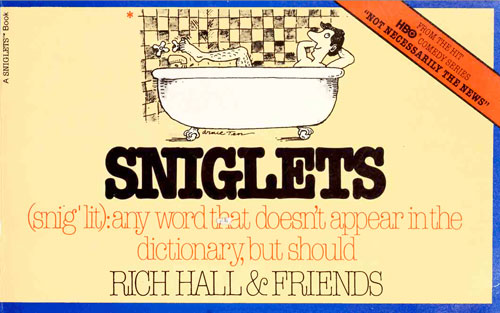
The first Sniglets book, which has been long out of print.
The thread between sniglets and what we might call crowdsourcing today
It wasn’t called such at the time, but sniglets popularized the use of crowdsourcing to create new words, which is now an indelible part of modern life.
NNTN encouraged viewers to send in their own sniglets, rewarding those whose sniglets were selected for use with a They Liked My Sniglets t-shirt! (These are seemingly impossible to find now; if anyone has a line on They Liked My Sniglet t-shirts, please get in touch) The books are all credited to “Rich Hall & Friends,” and there’s a Contributors page at the front of each one.
The influence of the Urban Dictionary, a platform entirely (and necessarily) built on crowdsourcing, goes well beyond anything Sniglets could have done, but of course, modern crowdsourced information is on an entirely different scale than it was pre-Internet. Surely Sniglets and its many sequels deserves more respect than lots of blank looks and two copies, one of which is missing, in a library system?
In his Cal Poly Magazine interview, Peckham explains that the Urban Dictionary “started as a parody of the real dictionary, because real dictionaries can be stuffy and take themselves too seriously.” In other words, like Rich Hall, Aaron Peckham was looking for a way to compile and share “any word that doesn’t appear in the dictionary, but should.”
Like sniglets, the Urban Dictionary started as a humor project, a clever idea meant to exploit and poke fun at the traditionally staid, complicated method of canonizing words by encouraging people to submit their own words and give names to places, things, emotions, and people that are well-known and often universal but officially nameless. Despite its devotion to “authority without authoritarianism,” the method of getting a word into Merriam-Webster is (necessarily) complicated.
On the other hand, Anyone can log in and submit a word to the Urban Dictionary, put it into the deep and wide neologism pool, and see what happens, just as anyone could fill out the form at the end of each Sniglets book and say “Dear Rich: Here’s my sniglet, which is every bit as clever as any in this dictionary.”
This tradition of lexiconical free-for-alls has influenced the ways actual dictionaries interact with people. Merriam-Webster has a free-wheeling, enormously popular Twitter account that keeps it in continuous conversation with anyone who wants to communicate with a dictionary as well as an “Ask The Editor” YouTube channel, which is directly responsible for introducing the world to then-associate editor Kory Stamper via a video in which she discussed the many plural versions of the word octopus. Stamper has gone on to be the first Merriam-Webster editor with her own Facebook fan club, introduce the word “F-bomb” into Merriam-Webster, and write the best-selling book Word by Word: The Secret Life of Dictionaries. Like Rich Hall, Kory Stamper made short, funny, engaging videos encouraging people to think about and interact with words.
1909
The year that the word “spork” first appeared in the The Century Dictionary and Cyclopedia where it’s defined as “a ‘portmanteau-word [!] applied to a long slender spoon having at the end of the bowl projections resembling the tines of a fork.” The word also appears in Sniglets. I assume the person who submitted spork to Rich Hall was unaware that the word had been around for at least 74 pre-Sniglets years and didn’t submit it dishonestly with a secret copy of The Century Dictionary and Cyclopedia tucked away in a drawer.
A quick glossary of the kinds of words that are considered sniglets
While there are no official rules for creating a sniglet, there are a few types that recur throughout the NNTN skits, books, and games:
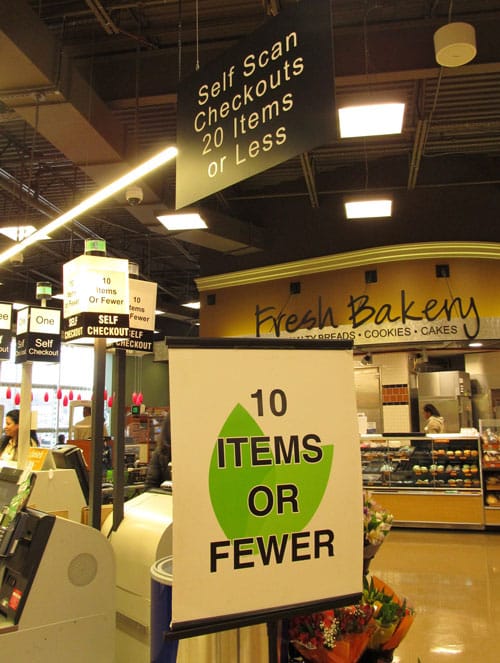
An express lane that doesn't know what it wants, not that an expresshole would care. (Lorianne DiSabato/Flickr)
Portmanteaus
Portmanteaus are the most popular type of sniglet, a trend that exists to this day. As I’m writing this on February 15, 2018, the top trending word at Urban Dictionary is dickle, defined as “when your dick is in a pickle (situation).” Portmanteaus are such a regular part of day-to-day conversation that we take them for granted within contexts ranging from current events (Brexit), to celebrity couples (Kimye), to cuisine (cronut), to entertainment (podcast). The word internet is itself a portmanteau of “international” and “network”! As in modern life, portmanteaus are ubiquitous and well-represented within the sniglet lexicon.
Accordionated:adj. Being able to drive and refold a road map at the same time.
Cigadent:n. Any accident involving a cigarette: for instance when it sticks to your lips while your fingers slide off and get burned.
Expressholes:n. People who try to sneak more than the “eight items or less” into the express checkout line. [Perhaps expressholes are in part responsible for the modern standard express lane item number of twelve?]
Hempennant:n. Any coattail, cuff, or dress hem dangling outside the door of a moving vehicle.
Profanitype:n. The special symbols used by cartoonists to replace swear words (points, asterisks, stars, and so on.)

Airloin. (Yuichi Sakuraba/Flickr)
Puns
Puns, specifically homophonic puns, come in next, or as the directions to The Game of Sniglets calls them “a simple spelling change.” These are perhaps the dorkiest sniglets, the ones that really highlight the “dad humor” qualities that surely made the books such popular additions to 80s bathroom reading.
Aeroma:n. The odor emanating from an exercise room after an aerobics workout.
Sushpect:n. Anyone who makes a noise telling you to be quiet, but doesn’t have the guts to verbally ask you.
Airloin:n. Unidentifiable serving of meat given as dinner on airplane flight.
Icision:n. Delicate operation performed on Neapolitan-flavored ice cream in which one entire flavor is precisely and systematically removed.
Unfare:n. The dollar you owe the cab driver before you’ve even moved a foot.
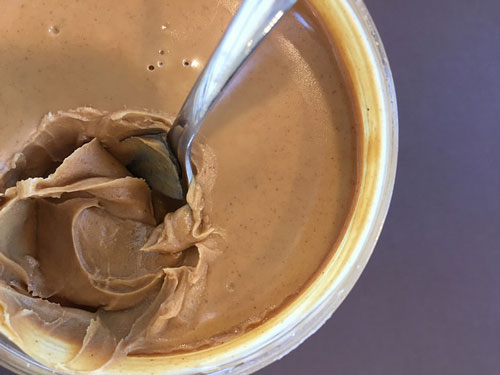
Jiffylust. (NIAID/Flickr)
Proprietary eponym combos
Proprietary eponym combos, or a “take-off on a well-known product.”
Gleemule:n. One unit of toothpaste, measured from bristle to bristle. (“Would you prefer CRESTULE?” asks The Game of Sniglets’s directions, conveying the surprising information that perhaps Gleem was a more popular mid-80s toothpaste than Crest. At any rate, as of 2014 ”Procter & Gamble now markets the Gleem formulation under the brand name Crest Fresh and White,” so once again, sniglets were well ahead of their time.)
Jiffylust:n. The inability to be the first person to carve into a brand-new beautiful jar of peanut butter.
Kedophobia:n. The fear of having one’s sneakers eaten by the teeth on the escalator.
McMonia:n. Noxious gas created by fast-food employee mopping under your table where you’re eating.
Twinkidue:n. The residue on the inside of the wrapper that every junk food addict eventually gets to.
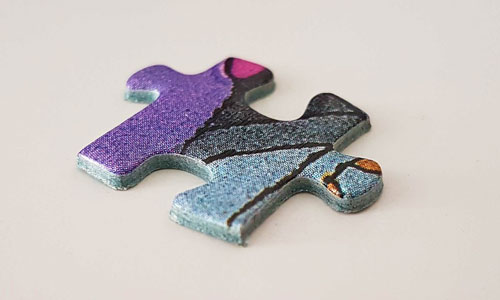
A knimpel.
Nonsense words
”It just sounds right...at least to us,” reads The Game of Sniglets directions. These were my favorite as a kid. I like to think that these are beloved, family-specific words, sent into Sniglets the way one might submit a favorite family recipe to be included in a cookbook.
Bleemus:n. The disgusting film on top of soups and cocoa that sit out too long
Clumfert:n. The invisible extra step at the top and bottom of a staircase. Usually materializes when one is carrying a large bag of groceries.
Gurmlish:n. The red warning flag at the top of a club sandwich toothpick which prevents the person from biting into it and puncturing the roof of his mouth.
Knimpel:n. The missing last piece of a jigsaw puzzle.
Lub:n. The small deposit of spinach that lodges itself between one’s teeth.

George Costanza blotches.
Onomatopoeia
Onomatopoeia, or “imitation of a sound made by or associated with its referent,” isn’t covered by The Game of Sniglets, but it stands out to me as a popular option and is perhaps the most poetic form of sniglet.
Blotch:v. To slap the bottom of a ketchup bottle with increasing intensity.
Glackett:n. The noisy ball inside a spray-paint can.
Lorp:n. The part of the shoe that collapses when you try to pull it on without a shoehorn.
Snorfing:n. The little game waitresses love to play of waiting until your mouth in full before sneaking up and asking “Is everything ok?”
Yump:v. To punch one’s glove in anticipation of an arriving baseball.
As I mentioned earlier, sniglets don’t get the recognition and respect they deserve. Rich Hall himself has gone on record as being a bit dismissive of his creation. In a 1990 interview, just one year after the publication of the sixth and final sniglets book, aptly named When Sniglets Ruled The Earth, when asked if he was surprised with his success, he answered:
The sniglets books are funny, but they’re really accessible. You know, typical mainstream pop comedy books that you can read in an hour. They’re really popular among the kind of people who like the language. They’re not for everybody, but they’ve done quite well. But I think it’s certainly more important to write something more substantial, and that’s what I’ve been working on.
He went on to point out, “When you assign this frailty of human nature a word, then the word has to work.”
His “more substantial” work eventually brought him to the United Kingdom, where he remains in the British public eye to this day. He’s created comedy specials and documentary series for the BBC, appears frequently on the quiz program (and panel show) QI, where he holds the record for the highest number of wins by a guest panelist, and performs regularly as Otis Lee Crenshaw, “a redneck jailbird from Tennessee, who has been married seven times, all to women named Brenda” who writes and performs “bourbon-soaked, Tom Waitsian tunes.”
I’m very happy for him, but I hope he’s become less dismissive of sniglets over the last 28 years.
I thank him for leading the way in what would become a world-wide past time: millions of people working together continuously at the task of assigning the frailty of human nature as many words as possible.
:format(jpeg)/2018/03/tedium030118.gif)
/2018/03/tedium030118.gif)


/uploads/cordaybw.jpg)